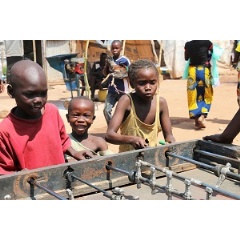Dramatic increase in violence in the Central African Republic - UNICEF
Situation update on children in the Central African Republic

This is a summary of what was said by UNICEF spokesperson Donaig Le Du – to whom quoted text may be attributed – at today’s press briefing at the Palais des Nations in Geneva.
"We have said for the past three years that the Central African Republic was one of the worst countries in the world to be a child. Sadly it is truer than ever. And the crisis is happening very far away from the eyes of the world and the media.
"The past year - and especially the last quarter - has seen a dramatic increase in violence. There are now an estimated 600,000 internally displaced people, up from 440,000 at the end of April – a big increase in the past 2-3 months. 600,000 is the number it was in April 2014 -- right after the peak of the crisis. And there are still 480,000 CAR refugees in neighboring countries. So out of an estimated population of a little over 5 million, one in five is either a refugee or displaced, half of them children.
"It is hard to see that CAR is spiraling into violence. Bangui, the capital, is quiet. The roads are bad, and with the rainy season and insecurity, it becomes nearly impossible to travel. There is limited cell phone coverage. For example, when six Red Cross volunteers were killed earlier this month in Gambo, the news took 2 days to get out.
"But beyond Bangui two-thirds of the country is controlled by armed groups. In the cities and villages that were recently affected by violence, that means that schools are closed. That teachers don’t dare to go to schools. Several NGOS have retreated, which means no health care. Supplies are looted – at one health centre, solar panels were stolen from solar fridges for example, which means no immunizations.
"These past months and weeks have seen horrendous reports on children’s rights violations. Precise numbers are impossible to know but we know for a fact that children have been killed; there have been incidents of sexual violence, and that recruitment into armed groups is happening. But there are less direct violations with lasting consequences – having to flee or take refuge in the bush; having no education or health care.
"One specificity of the conflict in CAR is that there is very little fighting between armed groups – they attack the civilian populations on the other side. And they are increasingly targeting MINUSCA and humanitarian actors.
"An open letter delivered by major international NGOs to the UN Secretary General yesterday identifies the Central African Republic as the most dangerous country in the world to deliver humanitarian assistance, with the world’s highest level of violence against humanitarian workers, accounting for one-third of all incidents targeting aid workers.
"The humanitarian crisis in CAR is taking place in the world’s least developed country. CAR is at the bottom of the Human Development Index – 188th out of 188 countries on the list. But the world cannot abandon CAR’s children – and right now there are few eyes looking at them and few hands trying to help.
"What UNICEF is doing: UNICEF operates out of Bangui and 4 zonal/field offices in Bambari, Bouar, Bossangoa and Kaga. In June and July, the Rapid Response Mechanism reached over 100,000 beneficiaries with non-food items and 37,000 with water, sanitation and hygiene support. UNICEF has helped set up 140 child-friendly spaces reaching 75,000 children, and set up temporary learning spaces in displacement camps and other hard to reach sites. Since 2014, over 10,000 children have been released from armed groups. UNICEF is also working to support the ministries of education, health and social welfare to restore basic but lifesaving services.
“As of the end of July, UNICEF’s US $46.3 million humanitarian appeal for children in the Central African Republic was 42% funded. The appeal has been revised up to $52.8 million, which leaves a 63% funding gap.”
About UNICEF
UNICEF works in some of the world’s toughest places, to reach the world’s most disadvantaged children. Across 190 countries and territories, we work for every child, everywhere, to build a better world for everyone.
( Press Release Image: https://photos.webwire.com/prmedia/6/212338/212338-1.jpg )
WebWireID212338
This news content was configured by WebWire editorial staff. Linking is permitted.
News Release Distribution and Press Release Distribution Services Provided by WebWire.